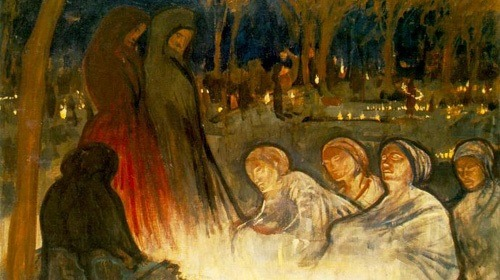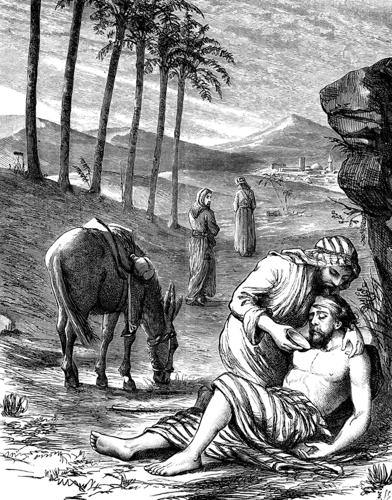𝗟𝘂𝗸𝗲 𝟭𝟮:𝟰𝟳-𝟰𝟴 𝗔𝗻𝗱 𝘁𝗵𝗮𝘁 𝘀𝗲𝗿𝘃𝗮𝗻𝘁 𝘄𝗵𝗼 𝗸𝗻𝗲𝘄 𝗵𝗶𝘀 𝗺𝗮𝘀𝘁𝗲𝗿’𝘀 𝘄𝗶𝗹𝗹 𝗯𝘂𝘁 𝗱𝗶𝗱 𝗻𝗼𝘁 𝗴𝗲𝘁 𝗿𝗲𝗮𝗱𝘆 𝗼𝗿 𝗮𝗰𝘁 𝗮𝗰𝗰𝗼𝗿𝗱𝗶𝗻𝗴 𝘁𝗼 𝗵𝗶𝘀 𝘄𝗶𝗹𝗹, 𝘄𝗶𝗹𝗹 𝗿𝗲𝗰𝗲𝗶𝘃𝗲 𝗮 𝘀𝗲𝘃𝗲𝗿𝗲 𝗯𝗲𝗮𝘁𝗶𝗻𝗴. 𝗕𝘂𝘁 𝘁𝗵𝗲 𝗼𝗻𝗲 𝘄𝗵𝗼 𝗱𝗶𝗱 𝗻𝗼𝘁 𝗸𝗻𝗼𝘄, 𝗮𝗻𝗱 𝗱𝗶𝗱 𝘄𝗵𝗮𝘁 𝗱𝗲𝘀𝗲𝗿𝘃𝗲𝗱 𝗮 𝗯𝗲𝗮𝘁𝗶𝗻𝗴, 𝘄𝗶𝗹𝗹 𝗿𝗲𝗰𝗲𝗶𝘃𝗲 𝗮 𝗹𝗶𝗴𝗵𝘁 𝗯𝗲𝗮𝘁𝗶𝗻𝗴. 𝗘𝘃𝗲𝗿𝘆𝗼𝗻𝗲 𝘁𝗼 𝘄𝗵𝗼𝗺 𝗺𝘂𝗰𝗵 𝘄𝗮𝘀 𝗴𝗶𝘃𝗲𝗻, 𝗼𝗳 𝗵𝗶𝗺 𝗺𝘂𝗰𝗵 𝘄𝗶𝗹𝗹 𝗯𝗲 𝗿𝗲𝗾𝘂𝗶𝗿𝗲𝗱, 𝗮𝗻𝗱 𝗳𝗿𝗼𝗺 𝗵𝗶𝗺 𝘁𝗼 𝘄𝗵𝗼𝗺 𝘁𝗵𝗲𝘆 𝗲𝗻𝘁𝗿𝘂𝘀𝘁𝗲𝗱 𝗺𝘂𝗰𝗵, 𝘁𝗵𝗲𝘆 𝘄𝗶𝗹𝗹 𝗱𝗲𝗺𝗮𝗻𝗱 𝘁𝗵𝗲 𝗺𝗼𝗿𝗲.
Peter had asked whether Jesus’ parable of readiness for his return was given for the disciples only, or all people. Jesus responded by describing the phases of judgment that will occur when he returns for his bride, the church. The overall advice to draw from the passage is “Be Ready”. That is, fight any temptation to slough off and become lax or negligent in one’s responsibilities. The picture is of diligence.
The word for “beating” means to flay or scourge – to whip, that is. It’s punishment in some form. The servant in this case is a believer in Christ who has not maintained a life directed by what s/he has learned and practiced. The shirking or malpractice of a life Jesus has saved will be punished to varying degrees. It’s hard to know what form it will take – if this refers to judgment that occurs after this life. If it is in this life, the blows can take many forms, including loss and removal from prominence.
The blows to be rendered to the disobedient servant is a clear warning to desist in abusing or ignoring what has been formed in the life of the servant. That admonition should be enough to get the believer’s attention.

The final sentence (“Everyone to whom …”) both predates and corrects the following Marxist statement:
“𝐹𝑟𝑜𝑚 𝑒𝑎𝑐ℎ 𝑎𝑐𝑐𝑜𝑟𝑑𝑖𝑛𝑔 𝑡𝑜 ℎ𝑖𝑠 𝑎𝑏𝑖𝑙𝑖𝑡𝑦, 𝑡𝑜 𝑒𝑎𝑐ℎ 𝑎𝑐𝑐𝑜𝑟𝑑𝑖𝑛𝑔 𝑡𝑜 ℎ𝑖𝑠 𝑛𝑒𝑒𝑑”
.. as that translates into redistribution of goods by the state. The oppression wrought by forced acquiescence to that iron-fisted edict has physically killed millions.
Jesus is speaking of willful giving – heaven’s purposes surely do require more from those with more. But it is out of the obedient heart of the servant and as directed by God that the “more” proceeds. It is to God that the servant of the gospel reports, and it is for (and truly, to) God the well-endowed servant gives. The demand is an expectation of love.
The passage is stark in its declaration of judgment for believers. The servants described are NOT those outside of Christ. It’s chilling in its duty-bound cause and effect proclamation, but what do I expect to happen to abusers within the Kingdom? Or do I judge them as not part of the Kingdom because of their bad words and actions? I am not the judge, I beat no one and can look on no one with an eye for revenge or payback. That’s God’s job.
For me, the message is to remain diligent in my relationship with Jesus and my fellow believers. Do NOT let my love grow cold and keep trusting God for all he will do.








